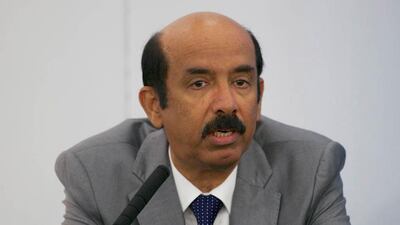When Mohammed Al Murr started writing short stories, decades ago, the literary landscape of the UAE was dramatically different from what it is now.
Most books were published by some form of governmental body – now independent publishers flourish. Young writers submitted poems or short stories to newspapers or magazines in the hope they might get printed – today, many publish their work online.
“There’s a new freedom in the writing itself because of all that,” says Al Murr.
For him personally, the change has been dramatic. The writer of 15 collections of short stories – two of which, Dubai Tales and The Wink Of The Mona Lisa, have been translated into English – he has gone from being a budding writer, juggling a job in banking, to newspaper editor, and is also a former speaker at the Federal National Council.
During a session on Emirati literature at last week’s London Book Fair, he suggests that while there is still much work to be done to encourage writing in the Emirates, he believes the country’s literary scene is in a good place. “Anyone who has followed UAE literature will see there are many styles, from the traditional to the very modern,” he says.
Al Murr shows a copy of Emirati Creative Works, a volume of poems and short stories in an English translation that he put together for the Sharjah International Book Fair last year.
It offers an impressive guide to the developing themes and features of Emirati literature over a period of incredible growth. It begins with Ibrahim Mohammed Ibrahim's traditional, desert-set 1996 poem Return Of The Shadow, and moves on to tales of office life in Bassima Younis' short story Sacking A Director General.
“The great vehicle that pushed our literature forward was the formation of the country itself,” says Al Murr. “The school system, the introduction of universities, students studying in the West – all of these things led to advancements in fiction and poetry.
“It was a renaissance, a flowering of many talents. Before that, we were hindered by the underdevelopment of education and high levels of illiteracy.”
Organisations such as Dubai Cultural Council, of which Al Murr was chairman between 2004 and 2008, the Department of Culture in Sharjah and Abu Dhabi Cultural Foundation have also helped to encourage literary talent in the UAE. But Al Murr believes that outside influences have also played a significant role.
Some fiction writing might still lean towards classical Arabic styles, but it has also been influenced by the techniques of 19th century writers including Anton Chekhov, Charles Dickens and Émile Zola.
“There’s often a heavy heritage of poetry in modern Emirati literature which, admittedly, can prevent you from seeing how the plot develops,” says Al Murr. “But my intention has always been to write in a way that reflects society and the human side of life. My stories are a mixed bag of realism, romance and sarcasm.”
There has certainly been a fragmentation in UAE literature, with writers talking to specific sections of society.
“The UAE is now open to the trends of international literature, mainly thanks to technology,” says Al Murr. “Breaking barriers and experimenting with literature is easier, as is finding, even creating, new audiences.”
The question remains as to whether these new audiences might include readers outside the Arab world.
“Thanks to events such as the Sharjah International Book Fair, there is a sense that we are linking with international publishers and translators,” he says, “though it’s worth pointing out that in the UAE we have this tradition for poetry, and translating that form is very difficult as it loses some of the beauty held in the language itself.
“Fiction is much easier. We have many translators now, which will open doors for more of our writers.”
artslife@thenational.ae

